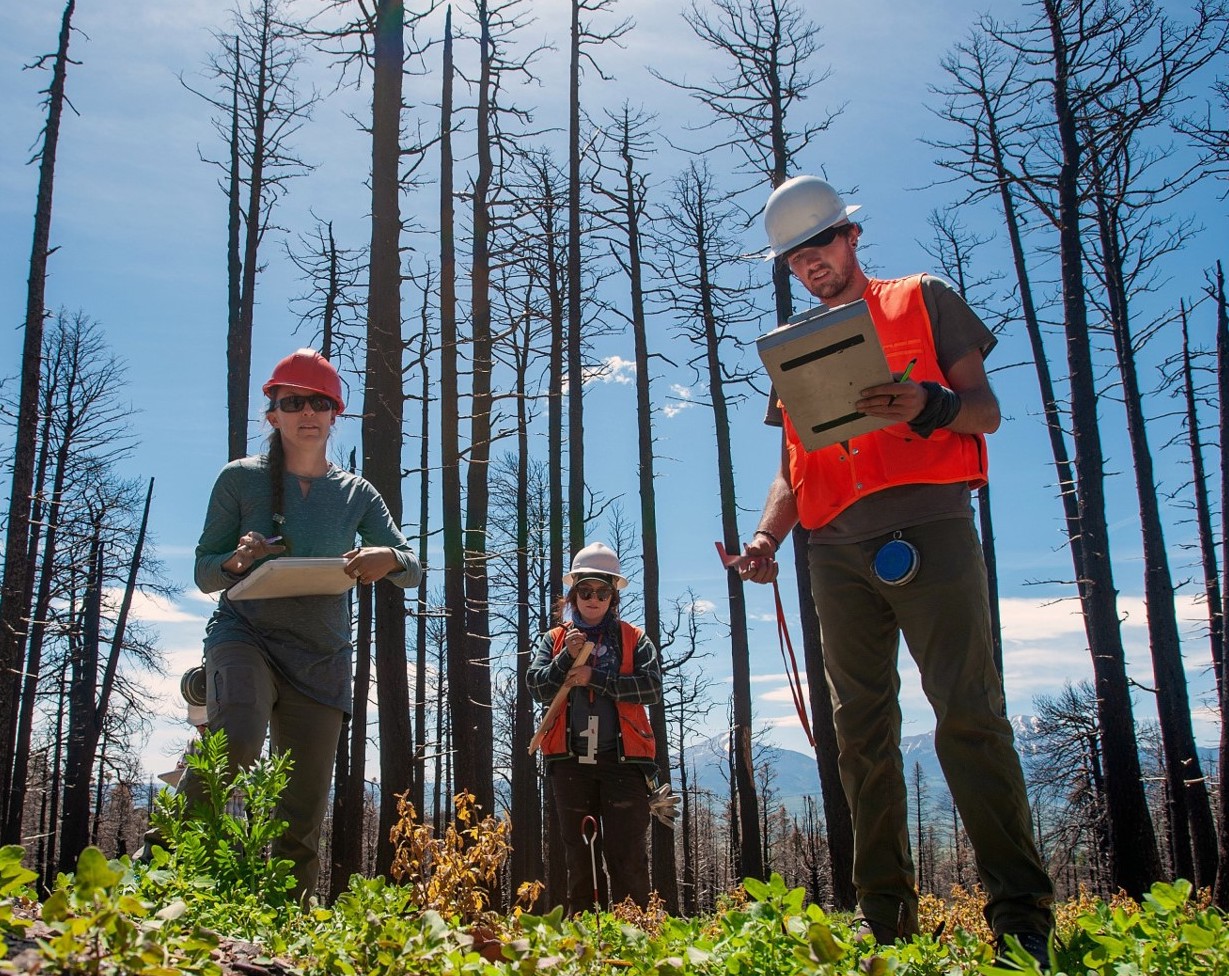
Camille Stevens-Rumann, assistant professor in the Department of Forest and Rangeland Stewardship, leads a team that will study relationships among fire, fungal colonization, water dynamics, longer-term plant succession, and erosion potential after the devastating 2020 wildfire season. Photo courtesy Camille Stevens-Rumann
Strengthening Colorado State University’s position as a leader in water research, the Colorado Water Center is funding five projects through the 2021-22 CSU Competitive Grant Program.
The Colorado Water Center serves as one of 54 National Institutes for Water Resources to address water-related challenges through research, training and collaboration.
The two awarded teams will explore how Colorado’s 2020 fire season altered food webs and the role fungi play in post-fire forest recovery. The awarded fellow and two education and engagement projects develop exciting new partnerships and content to engage underrepresented communities in the state’s water resources.
Projects span a broad range of disciplines and support 37 investigators and collaborators from across CSU and external agencies and organizations.
Water Research Teams
Effects of Cameron Peak Fire on food webs along an elevation gradient
The Cameron Peak Fire spanned over 2,000 meters in elevation, providing a unique opportunity to test how environmental variations controlled by elevation affect ecological changes caused by fire. Dan Preston, assistant professor in the Department of Fish, Wildlife and Conservation Biology, and a diverse team of CSU faculty, federal and state agency biologists and representatives from advocacy organizations seek to quantify how fire changes the flow of nutrients between ecosystems on land and under water. They will survey aquatic habitats of the threatened greenback cutthroat trout that are the target of substantial recovery efforts in the region. Project results aim to inform natural resource management within the Cache la Poudre Watershed.
Fire, fungi, and flora
In the water-limited forests burned by Colorado’s 2020 fires, fungi may play an important role in the water-holding capacity of soils as the first organisms to colonize environments after major disturbances. Camille Stevens-Rumann, assistant professor in the Department of Forest and Rangeland Stewardship, leads an efficient team that includes an expert in post-fire research and scientists from the Rocky Mountain Research Station and the Mountain Studies Institute. They will work to uncover links between fungi and hydrologic activity, . studying relationships among fire, fungal colonization, water dynamics, longer-term plant succession, and erosion potential.
“I am very excited to be working with the Water Center on this project as it enables us to understand the early post-fire impacts of the 2020 fire season,” Stevens-Rumann said. “Our team spans the multiple facets of the project and are located across the state, which increases the visibility of CSU and the Water Center as a leader in understanding post-fire recovery. This is a great opportunity for a graduate student as well as to build collaborations with stakeholders.”
Water Fellow
Toward an ethic for flowing waters
Rivers offer humans far more than simply water to drink and grow crops and places to recreate. Both the sciences and humanities show that rivers calm us physiologically, heal us psychologically, offer us solace after personal loss, and speak to our deepest needs for wholeness and resilience. Through a series of essays, Kurt Fausch, professor emeritus in the Department of Fish, Wildlife, and Conservation Biology, will develop a 21st-century ethic for our relationship to flowing waters. He will draw readers close to rivers, beneath their reflective surfaces and show them the challenges and opportunities these life-giving waters offer.
Water Education and Engagement Projects
Writing water: Engaging underserved youth and adults
Sparking a new partnership with the Colorado Water Center, Tobi Jacobi, director of the CSU Community Literacy Center, will develop and deliver an interdisciplinary curriculum extending current work with incarcerated youth and adults through the SpeakOut! program. The project will allow confined writers to grapple with local, place-based water issues through in-person or virtual field trips.
The primary mission of the Community Literacy Center is to create alternative literacy opportunities to educate and empower underserved populations (e.g., incarcerated juveniles and adults, women) and to support university-community literacy outreach programs. SpeakOut! serves over 300 writers annually and publishes creative and expository writing and art in the biannual SpeakOut! Journal.
Jacobi will lead an interdisciplinary team to develop a six- to eight-week curriculum, train CSU interns, develop an assessment tool, and pilot the program. The program will provide vital space for community engagement for this underserved population.
“The Community Literacy Center is thrilled to be partnering with the Colorado Water Center on this new water education and literacy project,” Jacobi said. “Our work in 2021-22 will feature a water-centered literacy project and will be integrated into our ongoing SpeakOut! writing workshops. This grant will launch new collaborations between writers and water experts and feature regional waterways and the issues they face.”
Connecting youth and families to the Cache la Poudre River
Connection and attachment to a place are key to motivating people to conserve that space. Nicole Stafford, director of the CSU Environmental Learning Center, will collaborate with a large team to develop bilingual, Poudre-specific activity guides for youth and families to use along the Poudre River Trail in Fort Collins. The guides will focus on access for underrepresented populations and will be available in printed and digital formats. Playful, inquiry-based activities aim to build connection, knowledge, attitudes, and action skills related to the Poudre River. Participants will discover the natural and human history of the river and the challenges facing the river.
Colorado Water Center
The Colorado Water Center leads interdisciplinary research, education, and outreach to address complex and evolving water-related challenges in Colorado and beyond. We do so by fostering collaboration between higher education and water stakeholders, synthesizing objective water knowledge to inform decision-making, and inspiring the next generation of water leaders.
Explore our resources and tools on water, including our CSU Water Experts database, publications, events, community job board, scholarships, CSU Water Directory, and much more.